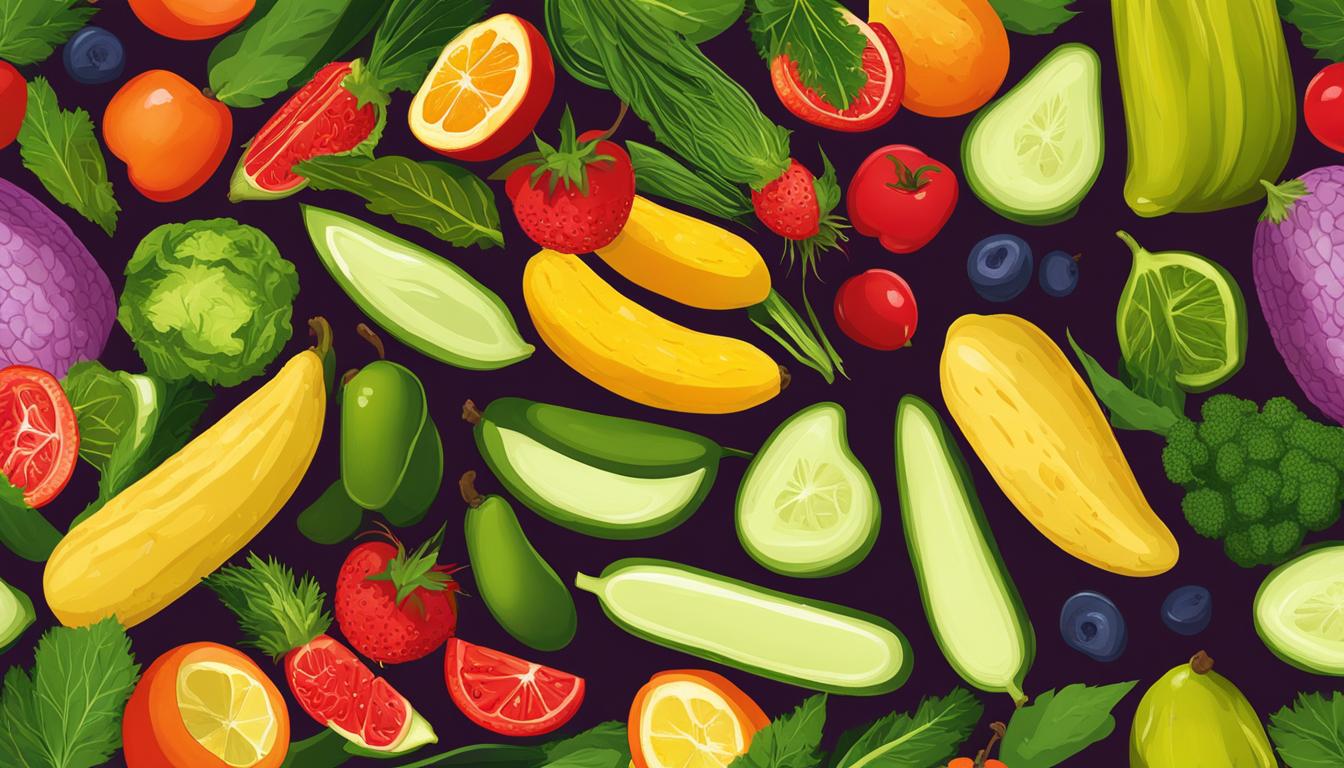Welcome to the world of pickles! Did you know that incorporating pickles into your meals can not only add a tangy and crunchy twist but also aid weight loss and boost your overall health? That’s right! Pickles have a lot more to offer than just being a delicious condiment. In this article, we will explore the various benefits of the pickle diet and how it can help you achieve your health goals.
Key Takeaways:
- The pickle diet can aid weight loss and boost overall health.
- Pickles are low in calories and fat, yet high in vitamins and minerals.
- Consuming pickles in moderation is important due to their high sodium content.
The Nutritional Value of Pickles
Pickles, made from cucumbers preserved in vinegar or saltwater brine, offer a range of health benefits and nutritional value. These tangy and crunchy delights are not only low in calories and fat but also packed with essential nutrients. Including pickles in your diet can be a delicious and beneficial way to support your overall health.
Pickles are a rich source of fiber, which aids digestion and promotes a healthy gut. They also provide significant amounts of vitamins A and K, essential for maintaining healthy eyesight and bone health, respectively. In addition, pickles offer an array of minerals like potassium, magnesium, and calcium, which contribute to proper bodily functions.
One of the key benefits of pickles is their antioxidant content. Antioxidants help protect the body against harmful free radicals, reducing the risk of chronic diseases like heart disease and certain types of cancer.
The nutritional values of pickles can vary based on the type you choose. For example, a cup of dill pickles contains a mere 5 calories, making them an excellent option for those watching their calorie intake. With just 1 gram of carbohydrates, pickles are also suitable for individuals following low-carb or keto diets.
However, it’s worth noting that pickles can be high in sodium due to the preservation process. A cup of dill pickles can contain around 325 milligrams of sodium, which may need to be taken into consideration for individuals on low-sodium diets or those with specific health conditions.
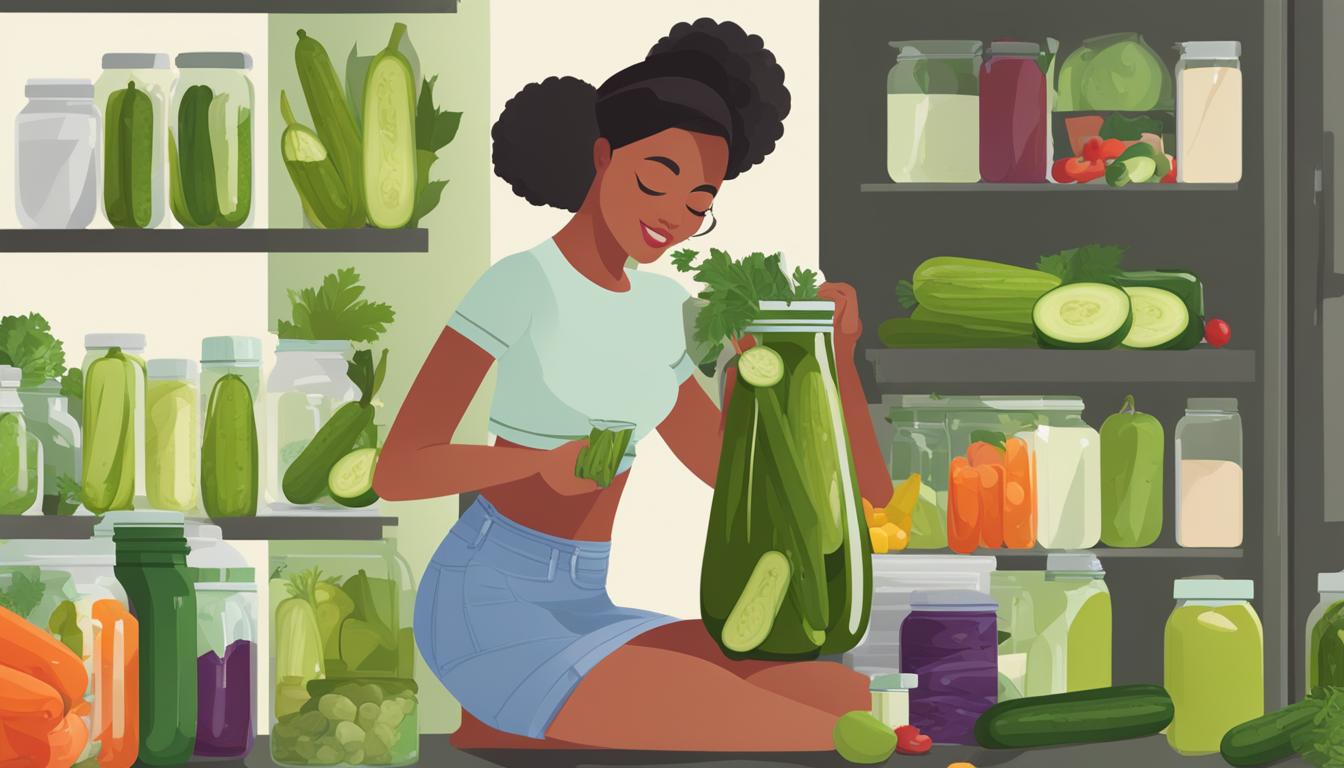
Pickles and Weight Loss
Pickles can be a beneficial addition to your weight loss journey. Due to their low calorie count and high water content, pickles can help you feel fuller for longer, aiding in portion control and reducing overall calorie intake. Additionally, pickles are a low-fat and low-sugar snack option, making them a healthy choice for those looking to lose weight.
One of the key components in pickles that may contribute to weight loss is acetic acid. The vinegar used to pickle cucumbers contains acetic acid, which has been shown to increase feelings of fullness and boost metabolism. This can potentially lead to burning more calories throughout the day.

However, it is important to note that the effects of pickles on weight loss are not yet fully understood. While some studies suggest that pickles can aid in weight management, more research is needed to validate these claims.
If you are considering incorporating pickles into your weight loss diet, it is recommended to do so in moderation. Like any food, pickles should be enjoyed as part of a well-balanced eating plan that includes a variety of fruits, vegetables, whole grains, and lean proteins.
Sodium Content and Health Risks
While pickles can be a healthy addition to a balanced diet, they are high in sodium. Excessive sodium intake can contribute to high blood pressure, heart failure, and kidney disease. Individuals with these conditions should consume pickles in moderation or opt for low-sodium varieties.
The vitamin K content in pickles may also interfere with certain medications.
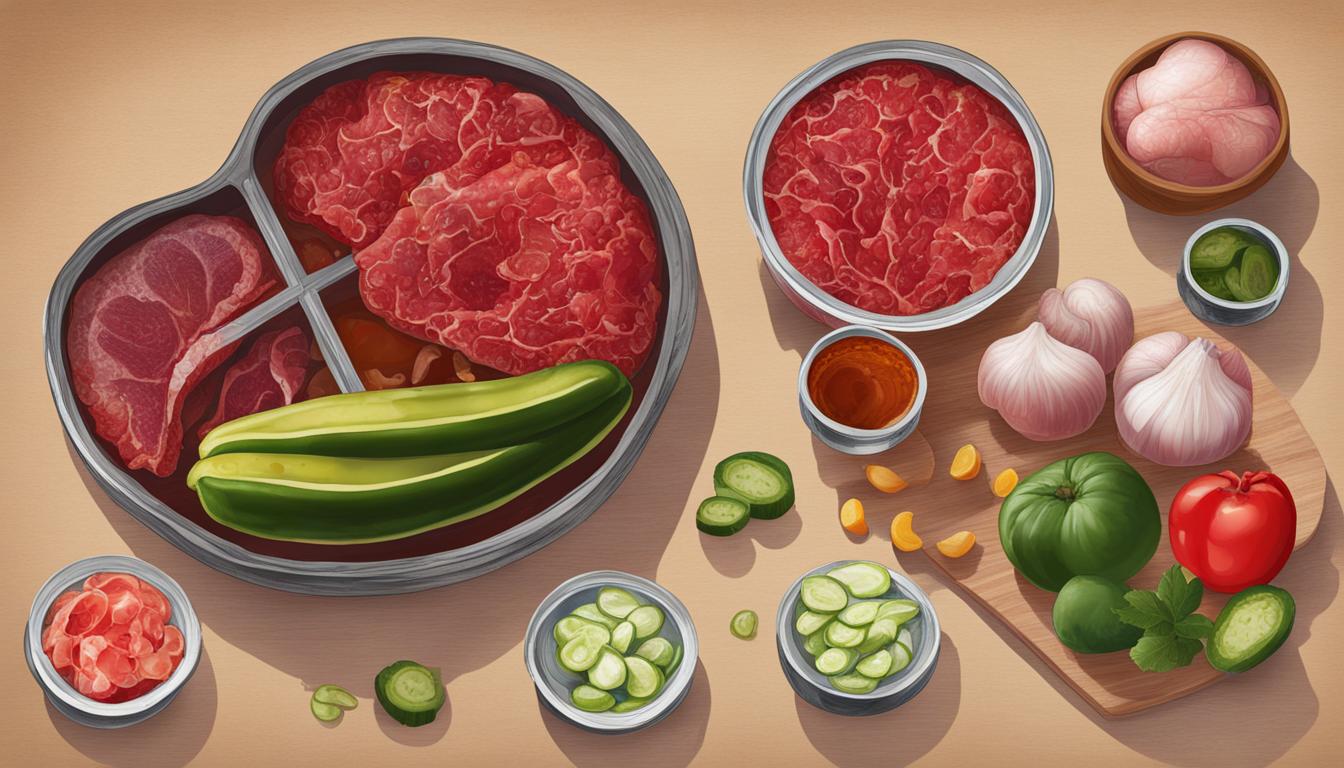
It’s important to be mindful of the amount of sodium you consume, as it can have negative effects on your health. High sodium intake has been linked to an increased risk of high blood pressure, heart disease, and stroke. Pickles, although low in calories, can be a significant source of sodium, depending on the brand and preparation method.
“The sodium content in pickles can vary widely. Some store-bought brands can contain up to 900 milligrams of sodium in just one serving,” warns Dr. Jane Wilson, a registered dietitian. “For individuals with high blood pressure or kidney disease, consuming excessive amounts of sodium from pickles can be detrimental to their health.”
However, not all pickles are created equal. Opting for low-sodium varieties or making your own pickles at home with less salt can help reduce your sodium intake while still enjoying the tangy taste. Keep in mind that pickles made with vinegar may still contain a significant amount of sodium, so it’s important to read the labels carefully.
Additionally, the vitamin K content in pickles may interfere with blood-thinning medications like warfarin. If you’re taking any medication, it’s best to consult with your healthcare provider before incorporating pickles into your diet.
Pickles for Gut Health
When it comes to supporting a healthy gut, fermented pickles can be a valuable addition to your diet. As a result of lactic acid fermentation, fermented pickles have a distinct sour taste and offer probiotic benefits to promote a robust gut microbiome.
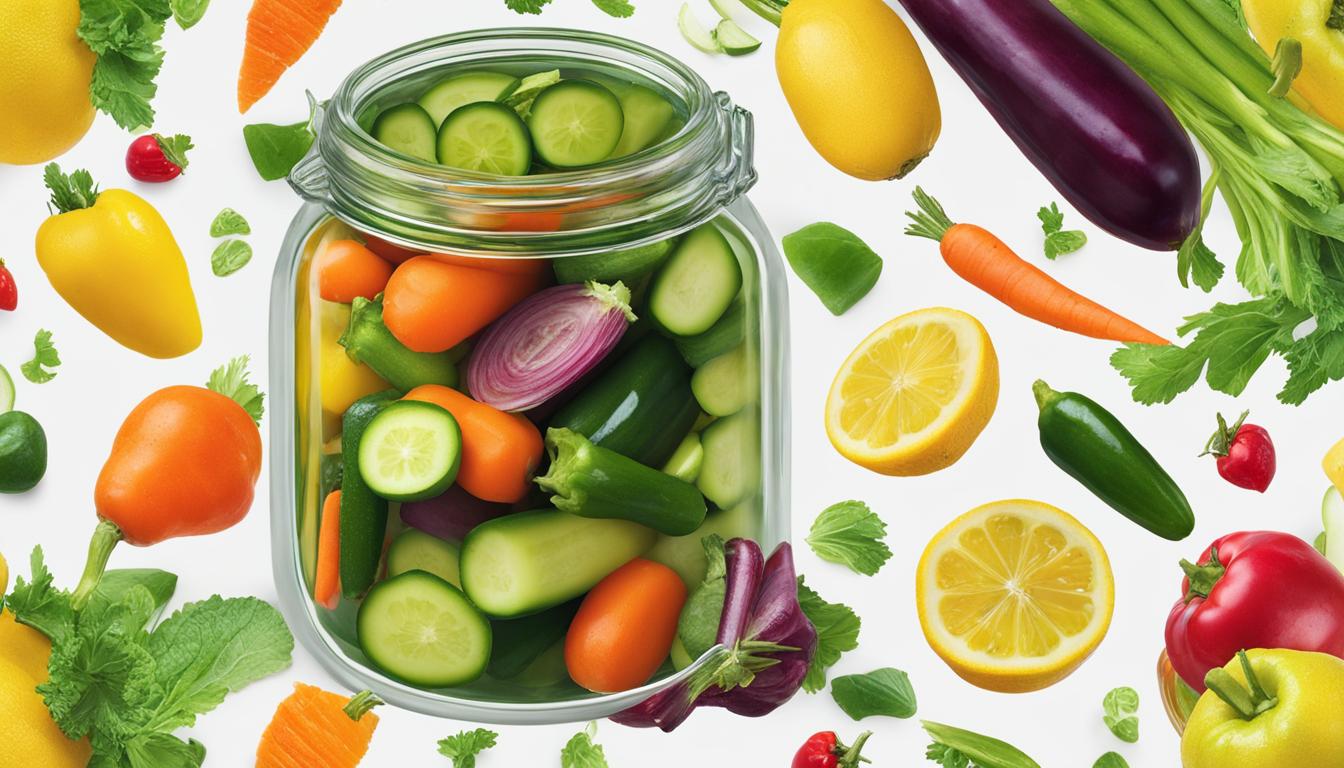
Probiotics, found in fermented pickles, play a crucial role in improving the diversity of bacteria in the gut. These beneficial bacteria help enhance digestion and promote overall gut health, making fermented pickles a great choice for those aiming to prioritize their gut health.
However, it’s important to note that pickles pickled in vinegar do not contain probiotics. Therefore, if you are specifically seeking probiotic benefits, make sure to choose fermented pickles.
“Fermented pickles provide a natural source of probiotics that can contribute to a healthy gut microbiome,” says Dr. Jane Mitchell, a renowned gastroenterologist.
Making Your Own Pickles
Why settle for store-bought pickles when you can easily make your own delicious and healthy pickles at home? Making pickles is a fun and rewarding process that allows you to experiment with flavors and tailor the pickles to your taste preferences. Plus, homemade pickles offer the added benefit of greater control over the sodium content. So, grab your apron and let’s get pickling!
Gather Your Ingredients
To make pickles at home, you’ll need a few key ingredients:
- Fresh and firm cucumbers
- Vinegar and/or salt
- Canning or pickling salt
- Spices and herbs for flavor (such as dill, garlic, or mustard seeds)
Choose cucumbers that are free from blemishes and have a crisp texture. This will ensure that your pickles turn out crunchy and flavorful.
Pickling Methods
There are two popular methods for making pickles:
Brining in Vinegar: In this method, the cucumbers are immersed in a solution of vinegar, water, and salt. The acidity of the vinegar helps preserve and flavor the cucumbers. You can experiment with different types of vinegars, such as white vinegar, apple cider vinegar, or rice vinegar, to create unique flavors.
Fermenting with Salt and Water: Fermented pickles are made by submerging cucumbers in a brine of salt and water. The natural bacteria present on the cucumbers convert the sugars in the cucumbers into lactic acid, resulting in tangy and probiotic-rich pickles. This method takes longer but offers additional health benefits.
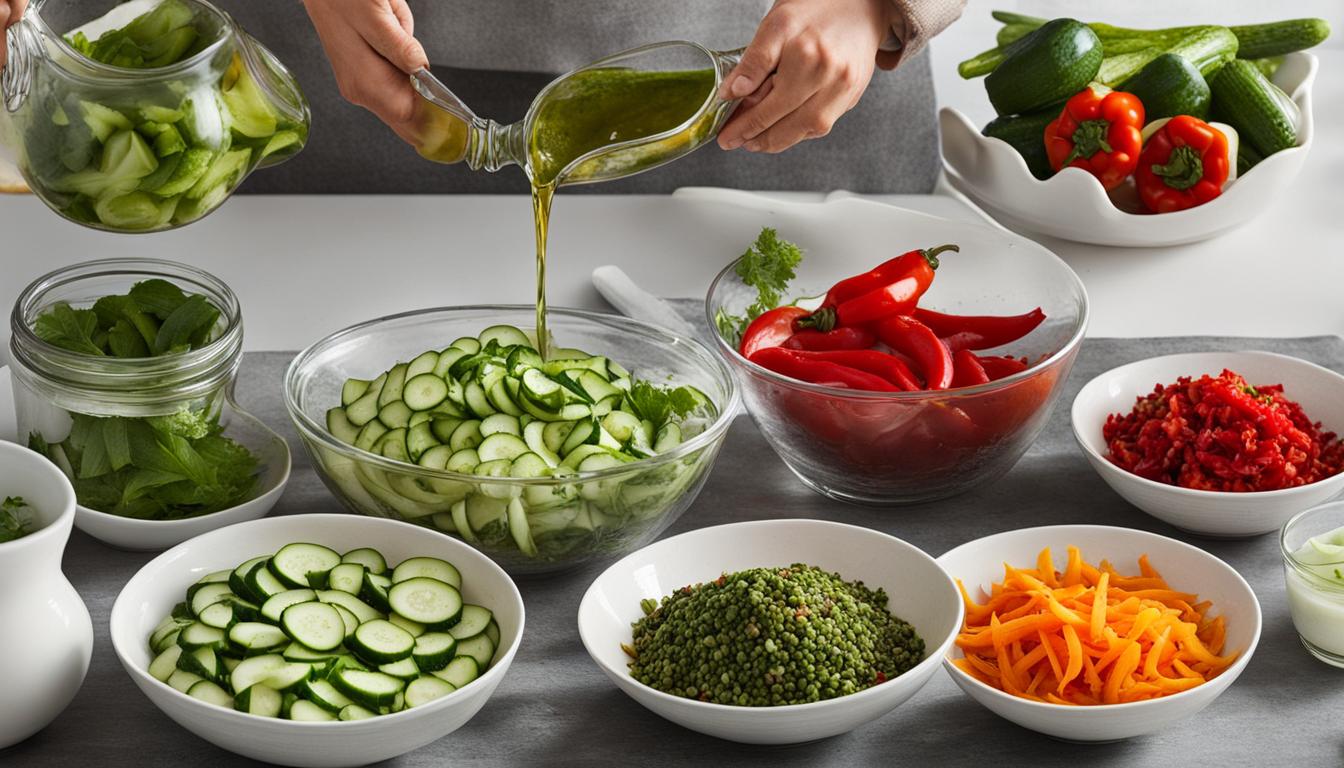
Follow the Process
Regardless of the method you choose, it’s important to follow proper boiling and canning instructions to ensure the safety and longevity of your pickles. This includes thoroughly cleaning your jars, heating the brine to a boiling point, and sealing the jars tightly. You can find detailed instructions online or in pickling recipe books.
Creative Flavor Variations
One of the joys of making pickles at home is the ability to experiment with different flavors and spice combinations. Feel free to get creative and add your favorite herbs, spices, or even a touch of heat with chili peppers. Let your taste buds be your guide!
Now that you have the basics of making your own pickles, it’s time to put your culinary skills to the test. Enjoy the satisfaction of biting into a homemade pickle that is bursting with flavor and made with love.
Pickles as a Low-Calorie Snack
Looking for a delicious and guilt-free snack option? Look no further than pickles! These tangy and flavorful treats make for an ideal low-calorie snack, perfect for anyone watching their calorie intake.
Did you know that a cup of dill pickles contains just 17 calories? That’s right, with such a low calorie count, pickles can be a fantastic addition to your calorie-controlled diet. So go ahead and munch on these crunchy delights without worrying about your waistline.
When choosing pickles as a snack, it’s important to opt for unsweetened varieties. Sweetened pickles may contain higher amounts of calories due to added sugars. By selecting unsweetened pickles, you can enjoy all the benefits without worrying about unnecessary sugars.
“Pickles are a great choice for those looking for a satisfying and low-calorie snack. Their crunchiness and tanginess make them ideal for curbing hunger pangs without loading up on calories.”
If you’re also watching your sodium intake, consider choosing low-sodium pickles. While pickles are generally healthy, they can be high in sodium due to the pickling process. Opting for low-sodium options can help you enjoy the benefits of pickles while keeping your sodium levels in check.
So the next time you’re reaching for a snack, grab a jar of pickles! Enjoy the delicious crunch, tang, and health benefits of these low-calorie delights.
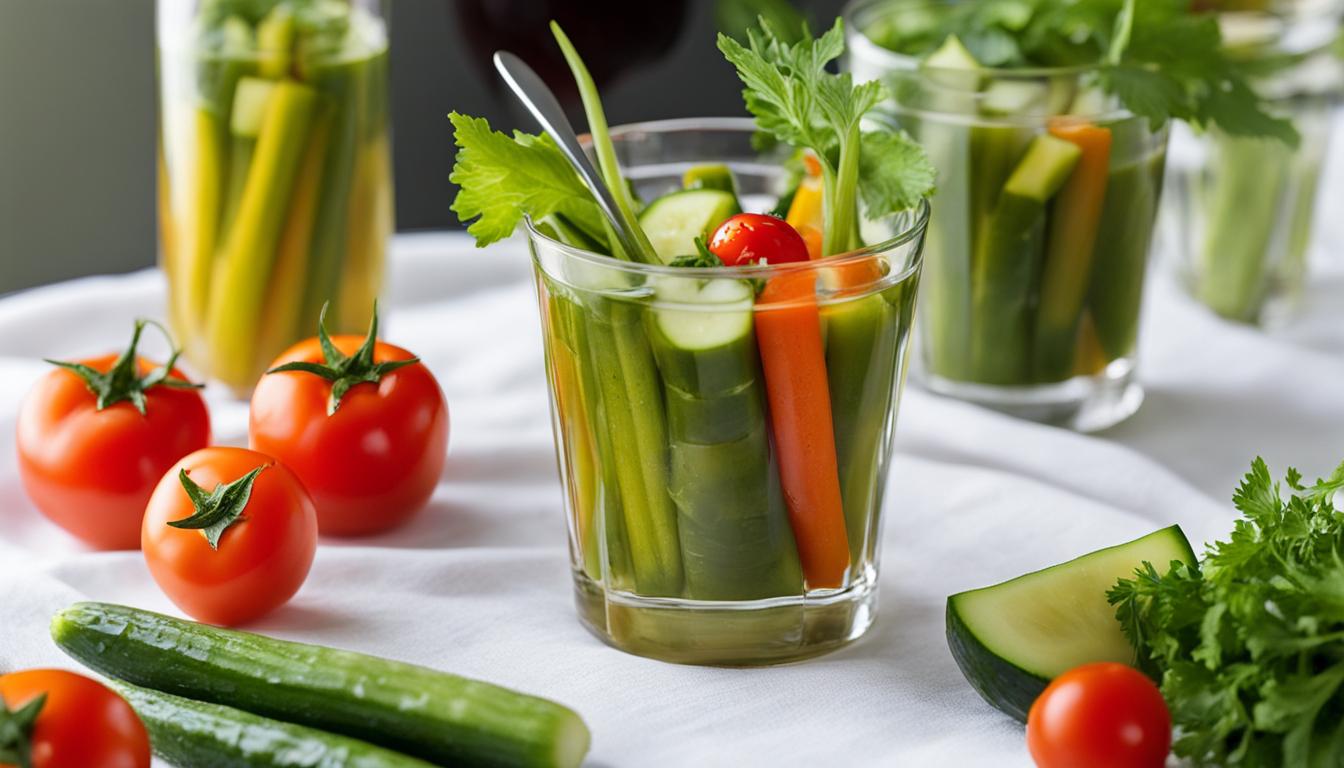
Healthiest Pickle Options
When it comes to choosing the healthiest pickles, there are a few options to consider. Low-sodium pickles are a great choice for individuals looking to reduce their sodium intake, especially those with high blood pressure or kidney conditions. These pickles have a significantly lower sodium content compared to regular pickles, making them a healthier option.
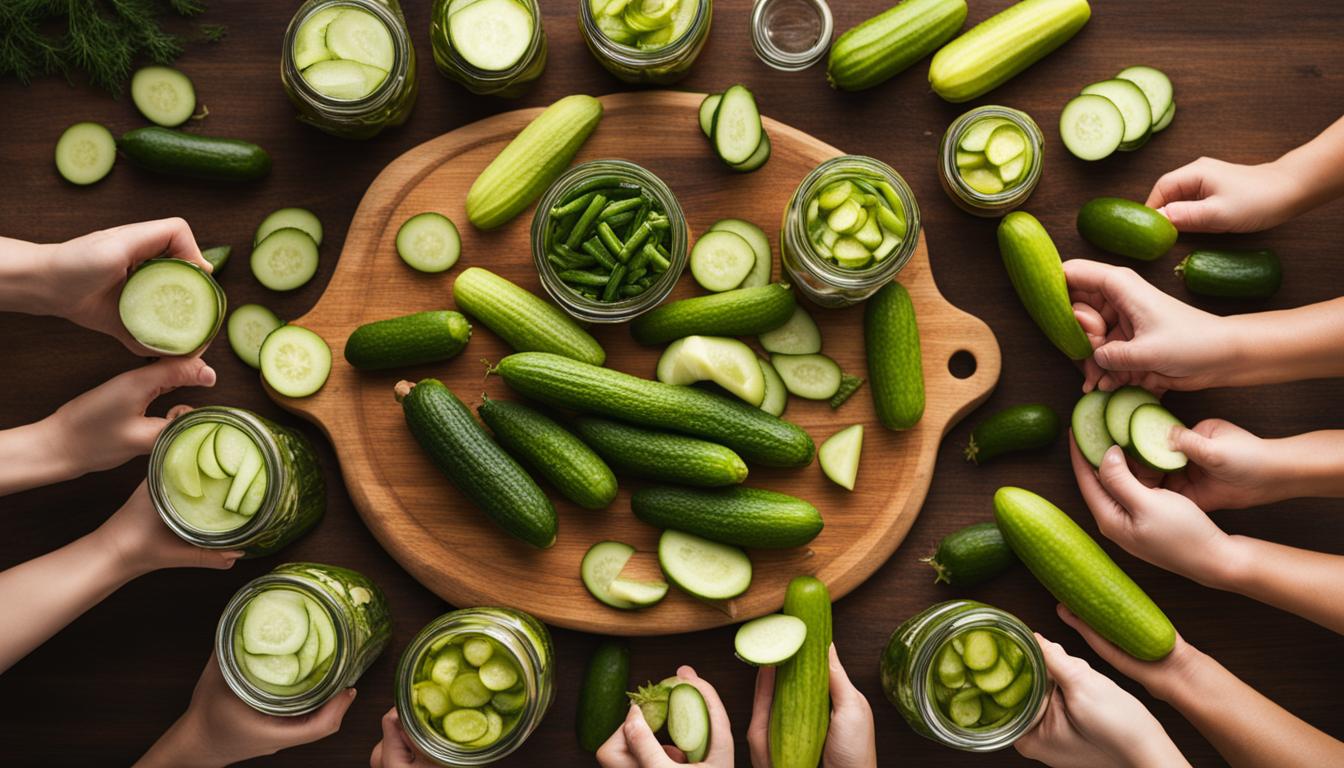
Another healthy choice is fermented pickles. These pickles undergo a natural fermentation process that not only gives them a tangy flavor but also promotes the growth of beneficial probiotics. Probiotics are beneficial bacteria that support a healthy gut and improve digestion. However, it is important to keep fermented pickles refrigerated to maintain their probiotic properties.
“Fermented pickles offer probiotic benefits, promoting a healthy gut microbiome and aiding digestion.”
If you prefer more control over the ingredients and flavors, making your own pickles at home is an excellent option. Homemade pickles allow you to customize the recipe, ensuring that they are low in sodium and packed with your favorite herbs and spices. By making pickles at home, you can align them with your dietary needs and create the healthiest version of this tangy treat.
Whether you choose low-sodium options, fermented pickles, or decide to make your own, incorporating pickles into your diet can add a flavorful and healthy twist to your meals.
Enjoying Pickles in Moderation
While pickles can be a delicious and healthy addition to your meals, it’s important to consume them in moderation. The pickle diet plan may sound tempting, but it’s crucial to understand the potential risks associated with excessive pickle consumption.
Pickles are known for their mouthwatering tangy flavor, but they also contain a high amount of sodium. This is due to the pickling process, which involves soaking cucumbers in a solution that typically includes salt. Consuming too much sodium can lead to health issues such as high blood pressure and kidney disease.
However, this doesn’t mean you have to completely eliminate pickles from your diet. The key is to enjoy them in moderation and be mindful of your daily sodium intake. Stick to the recommended serving size, which is usually one or two medium-sized pickles.
“It is safe to eat pickles every day as long as you adhere to the recommended serving size and consider your daily sodium intake,” says Dr. Samantha Richards, a registered dietitian.
If you’re unsure about the appropriate amount of sodium for your specific dietary needs, it’s always a good idea to consult with a healthcare professional or registered dietitian.
“If you notice any swelling or extreme thirst, it may be a sign to reduce your salt intake,” advises Dr. Richards.
Remember, pickles can still be enjoyed as part of a balanced diet. They can add flavor to your meals, provide a crunchy texture, and even offer some health benefits. Just be sure to eat pickles in moderation and prioritize a varied and nutrient-rich diet.
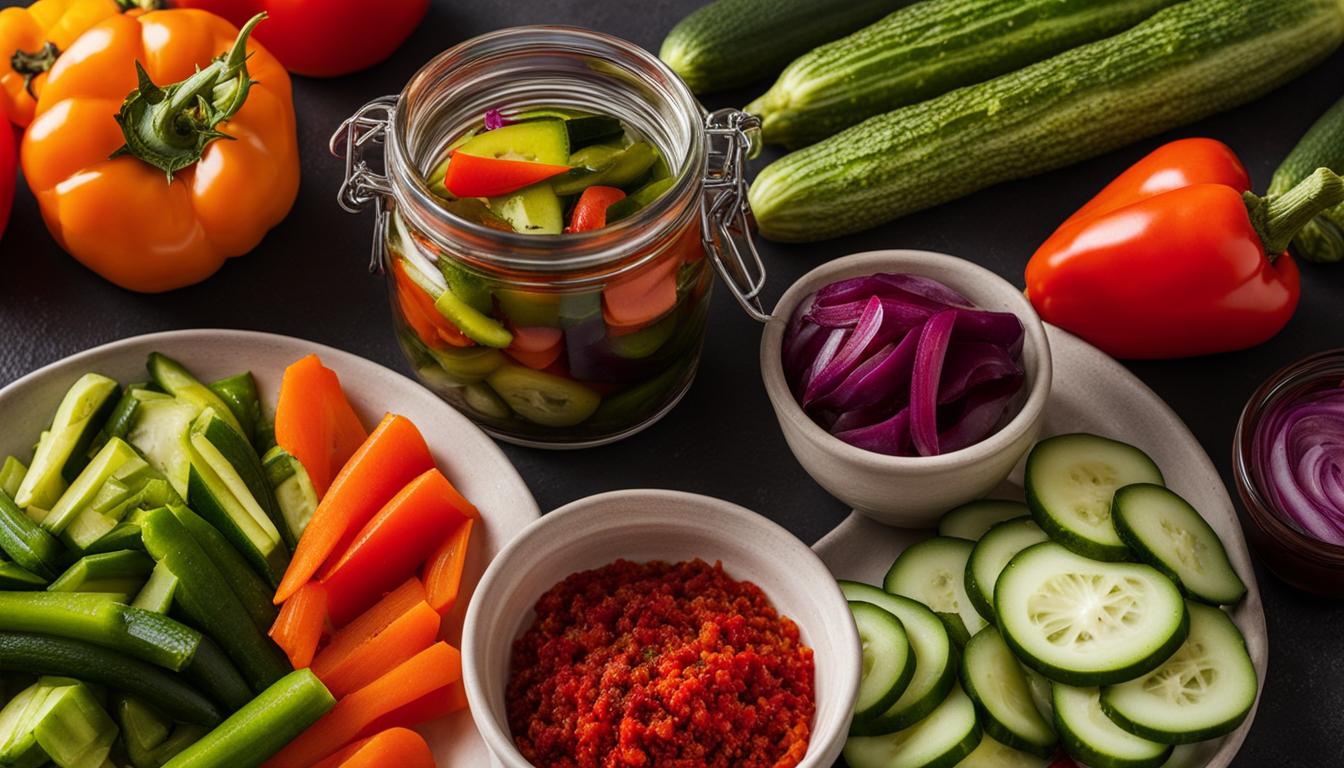
Choosing the Right Pickles
When it comes to enjoying the health benefits of pickles, it’s important to choose the right ones. By comparing labels, you can make informed choices and opt for pickles that are lower in sodium and sugar content. Avoid pickles that contain high-fructose corn syrup and artificial additives, as these can detract from the overall healthiness of the pickles.
The healthiest pickles are the probiotic-rich fermented options, such as deli-style kosher dill pickles. These pickles undergo a fermentation process that not only enhances their flavor but also boosts their probiotic content. Probiotics are beneficial bacteria that support a healthy gut microbiome and promote digestion.
Another option is to make pickles at home. This allows you to have full control over the ingredients and flavors. You can customize your pickles to suit your taste preferences and also ensure they align with your health goals. Homemade pickles can be a healthier choice as they do not contain any unnecessary additives or excessive amounts of sodium or sugar.
Remember, choosing the right pickles is key to maximizing the health benefits they offer. Whether you opt for fermented options or decide to make your own, you can enjoy the goodness of pickles while maintaining a healthy diet.
Image:
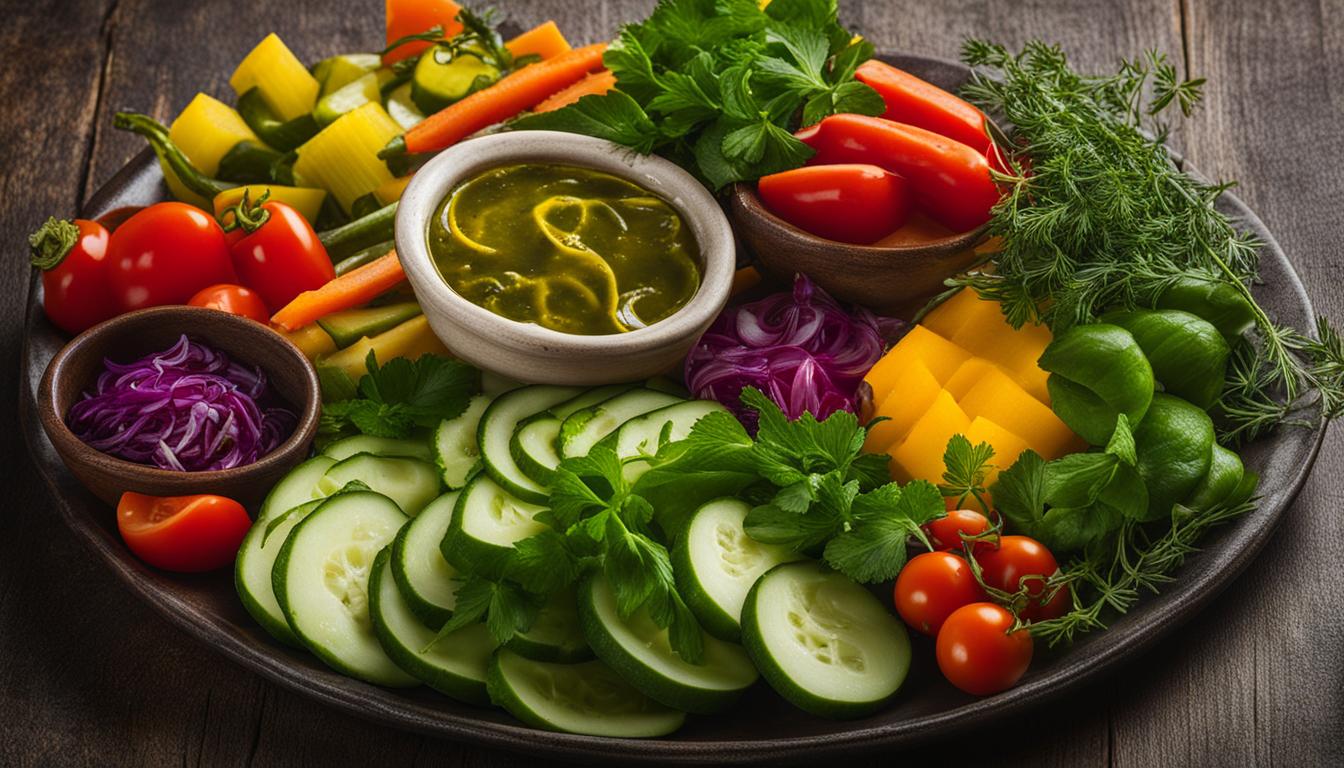
Conclusion
Incorporating pickles into your diet can provide a range of health benefits. Whether you’re looking to lose weight, support your gut health, or enjoy a low-calorie snack, pickles can be a flavorful addition to your meals. However, it’s important to consume pickles in moderation due to their high sodium content.
To make healthier choices, opt for low-sodium and fermented pickles. These options can help reduce your sodium intake and provide added probiotic benefits. Remember to enjoy pickles as part of a balanced diet and consult with a healthcare professional if you have any underlying health conditions.
With their unique flavor and versatility, pickles can be a tasty way to enhance your culinary experience. So go ahead, explore different varieties, or even try making your own pickles at home. Just remember to savor them in moderation and enjoy the benefits they can bring to your well-being.
FAQ
What are the benefits of the pickle diet?
The pickle diet can aid weight loss and enhance overall health. Pickles are low in calories and fat, high in vitamins and minerals, and can help curb sugar spikes and reduce cell damage.
What is the nutritional value of pickles?
Pickles are low in calories and fat and are a source of fiber, vitamins A and K, minerals, and antioxidants. However, their nutritional content varies depending on the type of pickle.
Can pickles help with weight loss?
Pickles can be beneficial for weight loss due to their low calorie count and high water content, which can help you feel fuller for longer. The acetic acid in the vinegar used to pickle cucumbers may also play a role in weight loss.
Are there any health risks associated with pickles?
While pickles can be a healthy addition to a balanced diet, they are high in sodium. Excessive sodium intake can contribute to high blood pressure, heart failure, and kidney disease. Individuals with these conditions should consume pickles in moderation or opt for low-sodium varieties.
Are pickles good for gut health?
If pickles are fermented, they can be a good source of probiotics, which support a healthy gut microbiome. Fermented pickles are created through a process of lactic acid fermentation, resulting in a sour taste. However, pickles pickled in vinegar do not contain probiotics.
How can I make pickles at home?
You can make pickles at home by brining cucumbers in vinegar or fermenting them with salt and water. Homemade pickles can offer greater control over sodium content and flavor variations.
Are pickles a good low-calorie snack option?
Pickles can be a healthy snack option due to their low-calorie count. A cup of dill pickles contains just 17 calories, making them ideal for calorie-controlled diets. Choosing unsweetened pickles is recommended, as sweetened pickles can be higher in calories.
What are the healthiest pickle options?
The healthiest pickle options are low-sodium and fermented varieties. Low-sodium pickles have a lower sodium content and are a better choice for individuals with high blood pressure or kidney conditions. Fermented pickles offer probiotic benefits, but it is essential to keep them refrigerated to maintain their probiotic properties.
Is it safe to eat pickles every day?
It is safe to eat pickles every day as long as you adhere to the recommended serving size and consider your daily sodium intake. Pickles should be consumed in moderation due to their high sodium content, which can contribute to health issues such as high blood pressure and kidney disease.
How do I choose the right pickles?
When selecting pickles, compare labels and opt for varieties with lower sodium and sugar content. Avoid pickles with high-fructose corn syrup and artificial additives.

